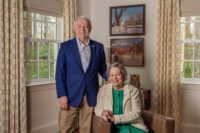Nonprofits | Philanthropy 2025: SELZER, LAWRENCE A. ‘LARRY’
Selzer has led The Conservation Fund since 2001, helping to protect vital lands and waters in the United States to provide greater access to nature, strengthen local economies and enhance climate resiliency. The environmental nonprofit, which is chartered for both conservation and economic development, has protected 9 million acres across all 50 states in the […]
Nonprofits | Philanthropy 2025: GHANIM, ISAM
Ghanim returned to ChildFund International in 2022, becoming its ninth president and CEO. He previously was vice president for the Africa region, vice president of global operations and executive vice president for programs before leaving to serve as Search for Common Ground’s president in 2018. ChildFund, previously named the Christian Children’s Fund, spent $169 million […]
Nonprofits | Philanthropy 2025: ARMSTRONG, SHERRIE
Armstrong is only the second president and CEO of the Community Foundation for a greater Richmond, established in 1968. She has held that position since 2015 after 26 years of leadership roles with United Way at local and national levels, including working as executive vice president of investor relations at United Way Worldwide and serving […]
Virginia Wesleyan University to be renamed Batten University
Next year, Virginia Wesleyan University will officially change its name to Batten University, honoring local philanthropist Jane Batten.
Carilion Clinic raises $96M for cancer center
Carilion Clinic is counting on public support to reach its $100 million goal to build a six-story cancer center in Roanoke.
UVA Health receives $50M in two anonymous gifts for Manning Institute
Two anonymous donors have given $25 million gifts to support the University of Virginia's Manning Institute of Biotechnology.
As federal cuts loom, Virginia universities redouble fundraising
Colleges are facing cuts in federal funding, and that creates more pressure to seek funds from private donors.
Norfolk casino developer pledges $1M to NSU
Boyd Gaming, the company behind the $750 million Norfolk casino, pledged $1 million to Norfolk State University to support its business school’s tourism and hospitality management program.
Virginia universities provide expansive maritime education
William & Mary launches Virginia’s first public bachelor’s in coastal and marine sciences, expanding maritime education and career options statewide.
McLean business leader’s foundation gives $20M to George Mason University
Kimmy Duong donates $20M to George Mason University, funding scholarships and naming the Long Nguyen and Kimmy Duong School of Computing.
Estes family donates $15M for William & Mary accounting center
Estes Express Lines' owners donate $15M to William & Mary to create the Estes Center for Excellence in Accounting at the Mason School of Business.
ODU breaks ground on $25M Barry Art Museum expansion
The Barry Art Museum at Old Dominion University in Norfolk is undergoing a massive $25 million expansion that will double its gallery space. ODU last week broke ground on the project, which will add a 25,200-square-foot, three-story wing that includes a multiuse event space, a new media video gallery showcasing multimedia artworks, a community gallery […]
























